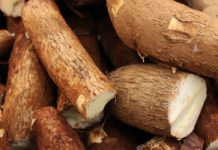Cashews are well known throughout the world for their buttery and mild salty and tasty flavor making it a food worth craving and eating. These seeds (they’re not nuts), scientifically known as Anacardium occidentale, grow attached to the fruit. First found growing in the Portuguese colony of Brazil, these seeds began to gain much popularity as they got exported over time and now grow in a number of places with a subtropical climate. Cashews fit so perfectly for inclusion in quite a number of dishes. One can even make a butter of it — cashew butter, which is a splendid alternative for peanut butter.
Health Benefits of Cashews
Improved Blood Pressure
Cashews contain two essential minerals involved in blood pressure regulation — potassium and magnesium. These minerals ensure blood vessel relaxation and counteract the effects of excessive sodium. Excessive sodium levels promote retention of water, which raises blood volume and blood pressure. Potassium is great for heart muscle contractility via nerve conduction.
A Healthy Skin
Vitamin C increases collagen synthesis in the body, while copper is a mineral that is involved in the maintenance of collagen and elastin. A deficiency of copper can lead to premature skin sagging. Consuming foods high in vitamin C promises a youthful looking skin. Eat cashews for a healthy skin.
Boosting Testosterone Levels
Hello men, *smiles* Selenium, present in cashew has been proven to boost testosterone levels. Selenium also reduces the risk of prostate and testicular cancer, and is particularly beneficial to men’s sexual wellness.
Protecting The Eyes
Cashews contain some amounts of an anti-oxidant called zeaxanthin, which prevents damage to the macula within the eyes. This anti-oxidant has got a UV filtering effect, which ensures that rays don’t cause damage within the eyes.
Dealing With Migraines
Magnesium is highly effective in treating migraines, and cashews have got magnesium. Magnesium plays a vital role in relieving spasm of the blood vessels under the scalp and making the nerves less sensitive to painful stimuli. This makes cashew simply great for you to eat as you treat a migraine.
Cashews Are Your Heart’s Friend
Even though cashews have high fat levels, they are not the kinds of fat that are bad for you. Cashews actually contain lots of monounsaturated and polyunsaturated fats, which are the kinds that are beneficial to the health of your heart, as they’re helpful in the reduction of cholesterol, and can keep blood vessels healthy. Just like Mediterranean diets which contain high levels of beneficial monounsaturated fats which are great for heart health, so is cashew. You can be sure to prevent heart-related illnesses by eating lots of cashews.
Cancer Prevention
Cashews contain essential compounds known as proanthocyanins, which are a class of flavonols that hinders cancer cell replication. This is an important function because immediately cancer cell replication begins, it becomes difficult to manage. What’s more? Cashews are rich in copper, a mineral which reduces the propensity of the cells to mutate. They’re also splendid in managing and preventing colon cancer.
Cashews Help Build Blood
Cashews possess loads of copper and iron which are undeniably important prerequisites in the production of red blood cells. What do red blood cells do? They carry hemoglobin, the protein to which oxygen binds and enables supply to cells throughout the body. Consuming cashews regularly will benefit your blood count, and will lead to increased energy levels in doing so.
Preventing Formation Of Gallstones
Gallstones are caused by low cholesterol levels and as a result of high circulating triglycerides. The rich monounsaturated fat content contained in cashews can reduce gallstone formation or risk.
Weight Loss

Now, this sounds ironical, but it’s true. Even though cashews are high-calorie foods, when eaten in moderation, they can actually help you lose weight. How amazing! This is particularly due to the beneficially large servings of monounsaturated fats which help to move stored fats into free fatty acids where they can be burned, and to the presence of copper, a trace mineral with vital effects on your metabolism. Deficiency of copper can negatively affect thyroid function. Copper is also an essential element involved in the synthesis of numerous co-enzymes which are involved in the body’s essential biochemical processes.
Increasing Bone Mass Density
Copper, present in cashew does increase the mineralization of bones. This makes bones more structurally dense and less prone to fractures or unmentioned.
Liver Support
The liver, responsible for the processing and breaking down waste products, does get overworked sometimes. Liver support is then needed from health-friendly foods like cashew seeds which help enhance its natural antioxidant potential. What’s more? Cashews contain copper, which assists in the production of liver enzymes and superoxide dismutase.
Improved Fertility
Trace minerals such as zinc and selenium can be of excellent support to fertility, as they’re effective in increasing sperm count, boosting testosterone, and also improving the quality of sperm. What a friend we have in cashew seeds.
What Happens When You Eat Excess Cashew Nuts?
Presence Of Excess Sodium
The level of sodium in cashew seeds is not so high; in fact, there is only 12 mg of sodium in 100 grams of cashew seeds. However, being a dry fruit, there are many times when cashew seeds are served in salted form, increasing the level of sodium to about 181 milligrams of sodium per ounce (which approximately equates 638 milligrams of sodium per 100 grams of cashew nuts). Now, that’s a lot. This level of sodium is not health-friendly, as it may increase the blood pressure level and lead to some other cardiovascular issues.
Remember that sodium is derived from other food items; if you eat junk food, be wary.
So What Do I Do?
Eat cashew nuts in moderation and give more preference to eating unsalted cashew nuts. If you are so particular about taste, then it’s okay to eat salted cashew nuts once in a while, being cautious of the quantity. People who are at risk of cardiovascular diseases or high blood pressure are advised to seek medical advice before eating salted cashew nuts.
They may Interfere with Certain Medications
Cashew nuts are an excellent source of magnesium (82.5 mg of magnesium per ounce of cashew nuts) which provides a lot of benefits like regulating body temperature, detoxification, keeping bones and teeth healthy and many more benefits. However, there are also some risks associated with magnesium and one of such risks is their ability to interfere with a number of drugs. Quinolone antibiotics, like ciprofloxacin and magnesium, may prevent adequate absorption of antibiotics.
Final Words…
How amazing this seed called cashew is. Who would ever had imagined that it’s got all these health benefits? It feels like a double advantage, really. It’s tasty, and it’s got so many health benefits. Isn’t that just amazing? So, how soon will you begin to leverage these super health benefits? How soon will you tell someone about it too? Let’s spread the news about these fantastic seeds. Let’s spread the cashew seed news.




